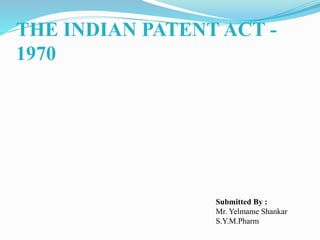
The indian patent act 1970
- 1. THE INDIAN PATENT ACT - 1970 Submitted By : Mr. Yelmame Shankar S.Y.M.Pharm
- 2. Patent A patent is a set of exclusive rights granted by a state (national government) to an inventor or their assignee for a limited period of time in exchange for a public disclosure of an invention. The term patent usually refers to a right granted to anyone who invents or discovers any new and useful process, machine, article of manufacture, or composition of matter, or any new and useful improvement. 2
- 3. HISTORY OF PATENT ACTS IN INDIA 1856 Act for protection of inventions on the basis of British law of 1852 1859 Patent monopolies called exclusive privileges (14 year) 1872 Patents and Designs Act 1883 Protection of Inventions Act 1888 Inventions and Designs Act 1911- 1947 Modern patent era by Patents and Designs Act. First time an authority call Controller General of Patents appointed 1959 Justice Ayyangar’s report 1967 Patent Act bill introduced in the Parliament 1970 The Patents Act passed by the parliament 1972 The Patents Act-1970 came into force on April 20, 1972 1994 Amendment by ordinance to include Exclusive Marketing Rights (EMR’s) 1999 Amendment passed by the parliament. New patent amendment bill referred to select committee 2003 2005 Patents Act 1970 with second amendment comes into force Patent Act 1970 (2005 Amendment) comes in to force from 1-1-2005
- 4. 4 1970 Act No product patent for chemicals, food and medicine No patents for agriculture and horticulture products Compulsory licences Patents to be worked in India.
- 5. Law and Regulations Patents Act, 1970 Amended in 1999 2002 2005 Patents Rules, 2003 Amended in 2005 2006
- 6. Patent Law - Salient Features • Both product and process patent provided • Term of patent – 20 years • Examination on request • Both pre-grant and post-grant opposition • Fast track mechanism for disposal of appeals • Provision for protection of bio-diversity and traditional knowledge • Publication of applications after 18 months with facility for early publication • Substantially reduced time-lines
- 7. Safeguards in the Patent Law • Compulsory license to ensure availability of drugs at reasonable prices • Provision to deal with public health emergency • Revocation of patent in public interest and also on security considerations
- 8. The Term Of Patent : In respect of a invention claiming process of manufacture of a substance intended to be used as food or medicine ---- 5 yrs from the date of sealing or 7 yrs from the date of patent whichever is shorter. In case of any other invention ---- 14 yrs from the date of patent.
- 9. Expiry Of A Patent A patent can expire in the following ways: 1. The patent has lived its full term. 2. The patentee has failed to pay the renewal fee. 3. The validity of the patent has been successfully challenged by an opponent by filing an opposition either with the patent office or with the courts. 4. As soon as the patent expires, it pass to the general public domain and now anybody can use it without the permission of the original inventor
- 10. Rights of a patentee 1. Right to exploit the patent. The patentee has a right to prevent 3rd parties, from exploiting the patented invention. 2. Right to grant license. The patentee has a power to assign rights or grant license. 3. Right to surrender. The patentee is given the right to surrender the patent by giving notice in prescribed manner to the controller. 4. Right to sue for infringement. A patentee is given the right to institute proceeding for infringement of the patent in a district court .
- 11. STAGES - FILING TO GRANT OF PATENT PUBLICATION OF APPLICATION REQUEST FOR EXAMINATION GRANT OF PATENT 3rd Party Representation Revocation/Amendment OPPOSITION • PROMPTLY AFTER 18 MONTHS FROM P.D. • WITHIN 48 MONTHS FROM F.D. • ALL OBJECTIONS TO BE COMPLIED WITHIN 12 MONTHS • WITHIN 12 MONTHS FILING OF APPLICATION PROVNL. / COMPLETE Decision of Controller EXAMINATION-ISSUE OF FER Appellate Board Appeal
- 12. Thank you
